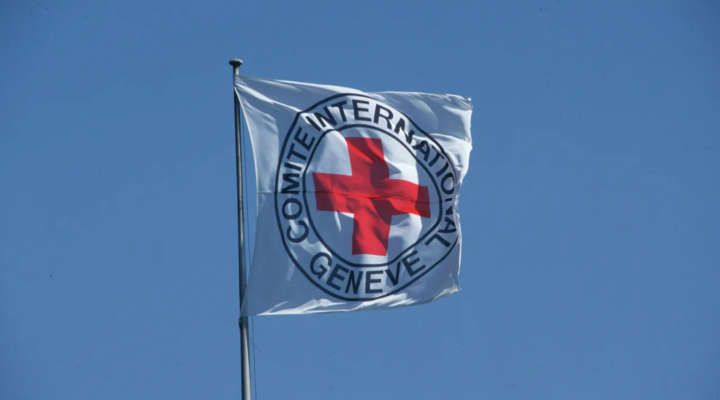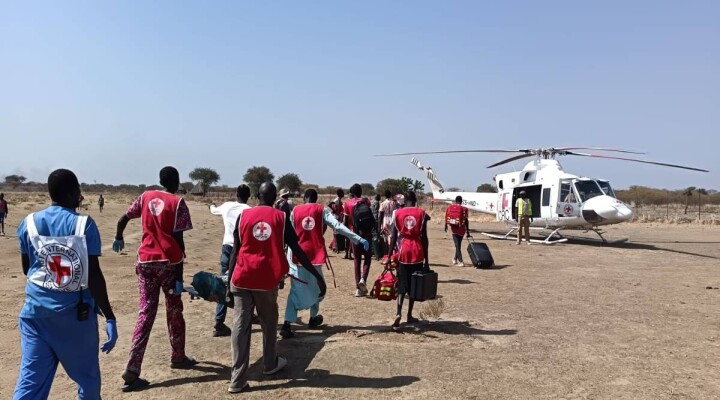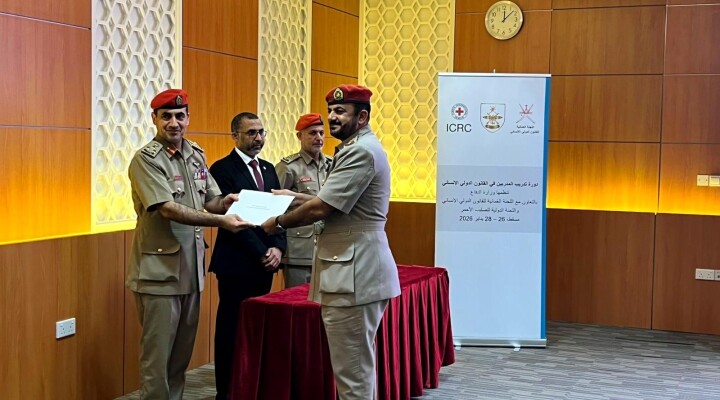Yemen: Amidst aid funding shortfall, millions are threatened by water and food shortages
More than half a decade of conflict has exhausted Yemenis and transformed the country into the world’s largest humanitarian crisis. Access to water, food and basic services is becoming harder for most Yemenis even as funding for humanitarian operations has fallen sharply.
In one of the most water-scarce countries in the world, Yemen’s water crisis affects millions of people a day. The nation’s network of water pipes reaches only 30% of the population and is damaged or in need of upgrading in many places. More than 15 million people resort to expensive and time-consuming ways to find enough water every day.
« There is no clean water here or any functional water projects. To get drinking water we have to wait for hours outside until water trucks come, » said Om Yahya, a mother of four living in the outskirts of Sanaa, who spoke to the ICRC while she was at the water point where people gather to wait for trucks. She often waits for several hours to fill a couple of water jerrycans that will barely cover her family’s needs for the day.
Millions of Yemenis often walk for miles to fetch water, exposing themselves to different risks, including the risk of assault.
« Our children have to walk long distances daily to get water without proper transportation which forces many among them to stop their education. They are also exposed to accidents because many must use donkeys to transport water. Because of that many children from the area are suffering from permanent disabilities , » said Hassan, a resident of Medi district of Haja Governorate .
In many areas, people are forced to use agricultural water for drinking, cooking and washing. Using water meant for agricultural purposes can generate serious health issues for the population.
A lack of access to potable water and little treatment of wastewater contributes to major health outbreaks, including cholera and acute watery diarrhea that started in October 2016 in a country where almost 20 million people lack access to basic health care.
The severity of acute food insecurity continues to worsen as the conflict prolongs. Most Yemenis survive on one meal per day and child malnutrition is increasing. The food security situation was aggravated by escalating conflict, the COVID-19 pandemic, flooding, a desert locust outbreak, economic collapse, and reduced humanitarian aid.
« My family relies on charity to eat. Food baskets are our only way to satisfy basic food needs. But most organizations stopped food support, so we mostly rely on community solidarity to help each other , » said Ali, a 45-year-old father of three, who is living in a temporary situation in Taiz and is unable to find a job because he is considered too old to work.
Although 24 million people out of a population of 30 million need some form of humanitarian assistance, funding for Yemen are decreasing drastically. Yemen’s latest international pledging conference earlier this year only reached 50% of the funding goal.
« It’s important that the world does not forget about the plight of the population suffering from the war and violence, » said Peter Maurer, the President of the ICRC. The worst-case scenario for Yemenis is that as the situation worsens, the world’s attention wanes.
The decrease in funding has a direct impact on people’s lives and our ability to sustainably provide life-saving aid to them and to reinforce fragile essential infrastructure in the way we need to. said Peter Maurer, the President of the ICRC.
For more information, please contact:
Basheer Omar (Yemen) +967 737889476 and/or +967 771 480 412
Imene Trabelsi (Beirut) itrabelsi@icrc.org +961 3 138 353
Ruth Hetherington (Geneva) rhetherington@icrc.org +33 6 33 28 88 23
Notes for editors:
Food Insecurity in Yemen:
· Six years to the conflict, exhausted financial resources and savings, with collapsing economy, high inflation rates and unemployment and soaring prices of basic commodities, leaving around 20 million people foods insecure.
· According to IPC Acute Food Insecurity Projection from January to June 2021, 16.2 million people going hungry, including some 5 million people on the verge of famine and nearly 50,000 people already experiencing famine-like conditions. It’s estimated 20 million people can’t find or afford enough food in Yemen today, with 3.2 million children and women acutely malnourished.
· In addition, it is estimated that 80% of Yemen’s population - or 24.1 million people out of a population of 30.5 million – need humanitarian assistance, with more than 14 million people are in acute need.
ICRC Water Response:
· 5 million people improved access to essential services through the rehabilitation of Water, Sanitation and Power infrastructures, including donation of heavy-duty machinery, generators, spare parts and consumables.
· 679,600 liters of fuel to operate water systems in Hodeidah, Bajil, Al Marawi’ah, Al Qutai, Al Mansuriyah, Bait Al Faqih, Zabid and Al Turaibah in Hodeidah Governorate were donated to the Water and Sanitation Local Corporation (WSLC) and aiming at reducing the gap on the support due to the cut of funding from the UN.
· WATA electro-chlorination devices for production of hypochlorite were donated to Public Works Project (PWP) and installed in 76 water rural projects and in 13 PHCs.
· In 15 places of detention visited by the ICRC, 11,960 persons deprived of freedom benefited from an improvement of infrastructure and essential basic services, to meet the minimum requirements to ensure healthy living conditions
ICRC Yemen funding:
· The ICRC’s Yemen budget this year is our largest yet – 128 million CHF (118 million Euro/143 million USD), an indication of the deepening need.
· More than 5,811,970 benefited from the ICRC services in the filed of health.
Log-list
(Yemen- Amidst aid funding shortfall, millions are threatened by water and food shortages)
SHOTLIST
AV Production number 20210703-Yemen-Maurer visit
Location: Aden, Taiz, Saada, Haja, Mukalla, and Sanaá
Length:
Format: HD mp4
Cameraperson: Taha Saleh/Ali Alsonidar/Ahmed Waqas/Alaa askool
Producer: Wagdi Almaqtari/ICRC
Production languages: Arabic
ICRC ref: AV Production number 20210703
Filming date: Various
Copyright: ICRC access all
SCRIPT
00:00 Taiz, external shots of Ali – Destroyed buildings water tanking
01:17 Indoor shots inside Ali’s home
01:34 Soundbite: Ali Suliman displaced from Hodeida living in Taiz
We left Hodeida to come here (Taiz) There is war in both places, but at least there we had water system but not here. No Water No electricity, plus we are no longer housed for free.
01:54 We receive water twice a week a total of 2000 letters, some good people would come to distribute an additional water to help us cover water needs
02:13 I don’t work, there is no work. My family relies on charity to eat. Food baskets are our only way to satisfy basic food needs
02:22 But most organizations stopped food support, so we mostly rely on community solidarity to help each other
02:32 Where to work? When I go to find a gob, I am told that I’m too old and that they are looking for younger people.
02:40 We rely on rains to obtain cooking and cleaning water. If it doesn’t rain, we go door to door to get a gallon or two of salty water that we use for cleaning and cooking and maybe half a gallon of drinking water. When that is not possible, we have to go buy drinking water.
03:04 Our wish is that the war stops.
That we go back to our hometowns.
That life goes back to normal
These are our hopes
03:13 Sanaa, external shots for a waterpoint, kids and women waiting to fill their buckets
04:24 Soundbite: Om Yahia, (Housewife, Sanaa)
There is no clean water here or any functional water projects. To get drinking water we have to wait for hours outside until water trucks come
04:44 Soundbite: Mohammed (local man, Sanaa)
We have to walk 2 km to reach the tanking point then push the trolley back home or carried on the head. The situation is very hard
04:55 Soundbite: Om Ibrahim (Housewife, Sanaa)
We really need water here; the water truck is too expensive for us now.
We can’t afford to fill in our tanks every week or even every two weeks, we can only afford a monthly fill
05:06 Haja, outdoor shots for water points in Medi district in Haja, kids carring water buckets by donkeys
05:32 Destroyed water project in Alqes village, Haja
06:17 Hassan (a resident of Medi district of Haja Governorate )
Citizens living in the villages of the district Medi are suffering because war destructed all water projects.
06:17 Our children have to walk long distances daily to get water without proper transportation which forces many among them to stop their education.
06:35 They are also exposed to accidents because many must use donkeys to transport water. .
06:51 Because of that many children from the area are suffering from permanent disabilities.
08:01 (A housewife from Aden)
Life is so hard; it is indescribable
08:09 Sanaa cityscape and old Sanaa city
08:16 Different shots while cooking with fire outside duo to lack of cooking gas
08:36 (A housewife from Sanaa)
the war has affected us severely, and life become unbearable
Getting food becomes a luxury.
This is not a life!
08:47 We want to live in safety and security without war,
we would like to sleep without fear.
we don’t feel safe,
we are in a difficult situation.
09:02 Shots for houses near frontlines – Taiz
09:07 Preparing a meal with available ingredient
09:22 Indoors shots
09:31 A family meal gathering, (this food is from a charity)
10:06 A housewife from Taiz
We are displaced. We have got this destroyed house to live in it.
We used to eat well – fruit, chicken and so on,
but now we hardly get something to eat.
10:20 We live in a conflict area, and there are not enough water resources. We have to walk long distances to fetch some water. We cannot go out at any time but wait for the clashes to stop as we are caught on the frontlines where parties to the conflict continue to fire at each other.
We are living on a frontline area. No one knows about us and the situation we have been through.
10:45 I am divorced, with 7 children and my ex-husband kicked us out of the house. We didn't have a choice but to live in this destroyed house because we can't afford to rent.
10:57 Peter Maurer President of ICRC on Humanitarian situation un Yemen
No woman, child or man in Yemen has been untouched by the long duration of war.
We see enormous disruption of societies, people are killed directly by the war but they are suffering by the indirect impact of the war, from the destruction of health facilities, from the destruction of water and sanitation facilities and schools.
11:10 It’s important that the world does not forget about the plight of the population suffering from the war and violence.



